Report on People Management Challenges During the COVID-19 Pandemic
VerifiedAdded on 2023/01/03
|9
|2532
|36
Report
AI Summary
This report investigates the impact of the COVID-19 pandemic on people management practices within UK organizations. It identifies contemporary issues faced by line managers, including challenges related to employee mental health, remote work management, and employee engagement. The report further explores the necessary knowledge, skills, and behaviors required for effective people management in this environment, emphasizing the need for reinventing team dynamics, behavioral changes, and policy adjustments. Finally, the report examines the efforts made by HR processes and support management in optimizing performance management, such as flexible work hours, role shifting, improved communication, and the implementation of new policies. The report underscores the need for adaptability and strategic adjustments in response to the evolving challenges presented by the pandemic to ensure effective people management.
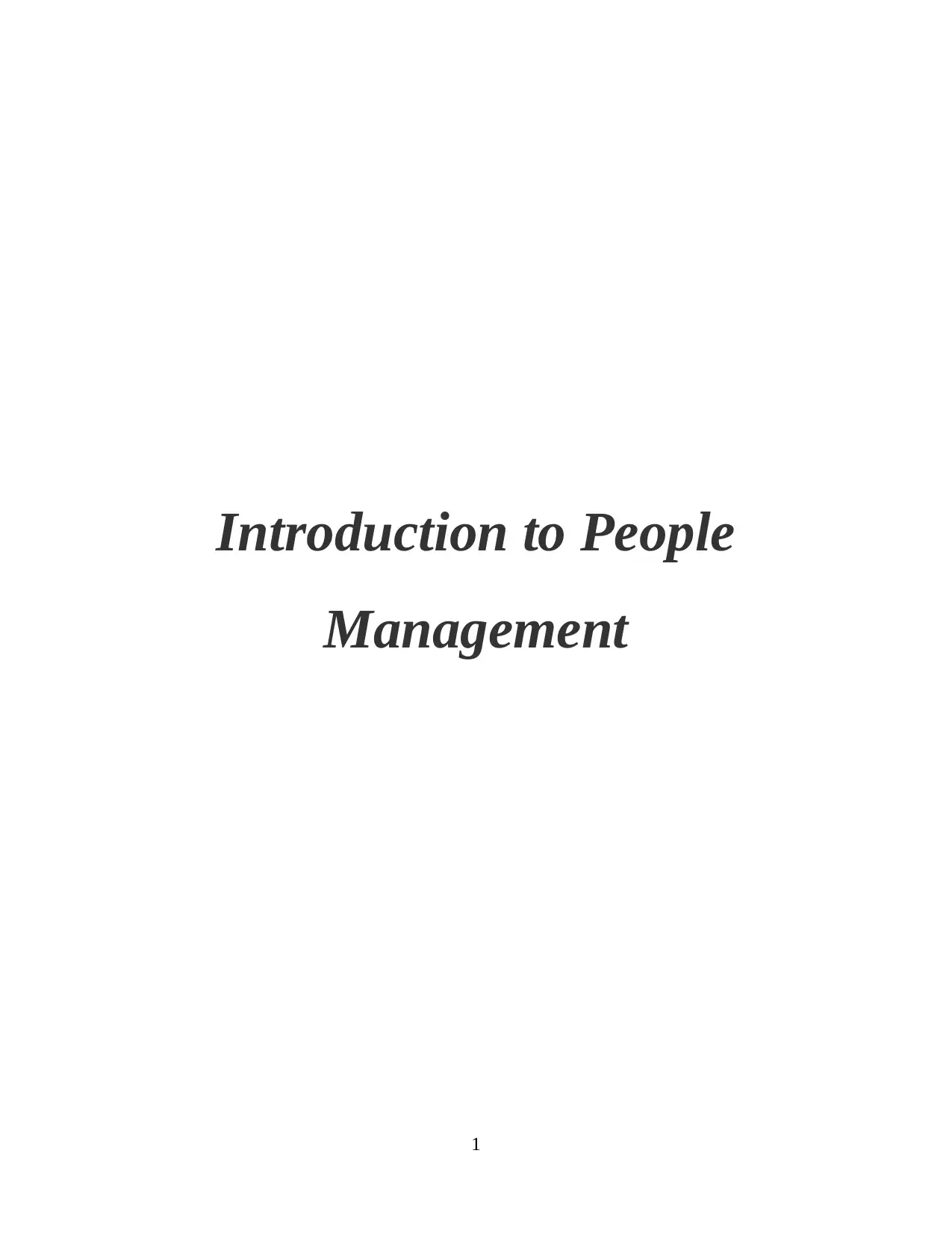
Introduction to People
Management
1
Management
1
Paraphrase This Document
Need a fresh take? Get an instant paraphrase of this document with our AI Paraphraser
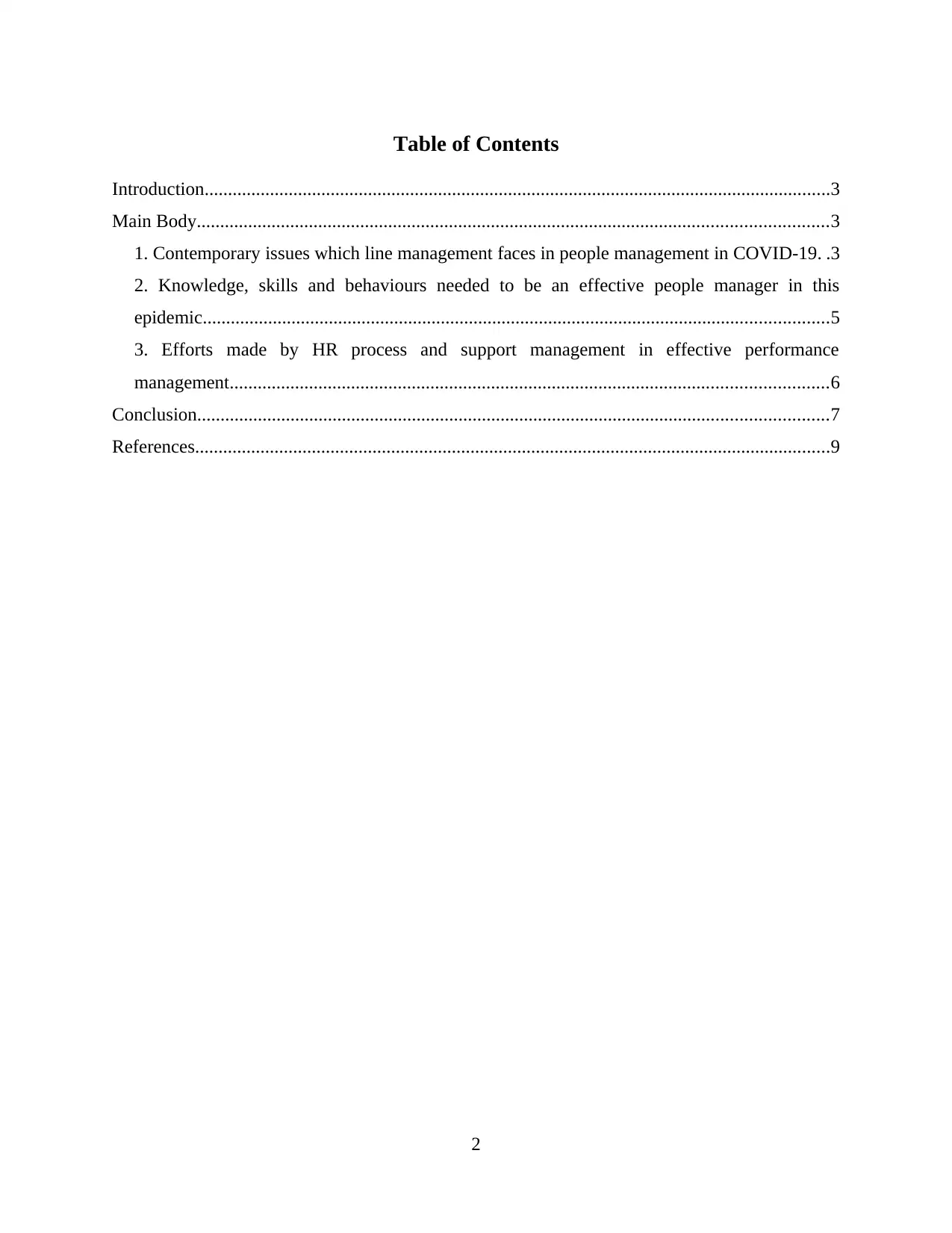
Table of Contents
Introduction......................................................................................................................................3
Main Body.......................................................................................................................................3
1. Contemporary issues which line management faces in people management in COVID-19. .3
2. Knowledge, skills and behaviours needed to be an effective people manager in this
epidemic......................................................................................................................................5
3. Efforts made by HR process and support management in effective performance
management................................................................................................................................6
Conclusion.......................................................................................................................................7
References........................................................................................................................................9
2
Introduction......................................................................................................................................3
Main Body.......................................................................................................................................3
1. Contemporary issues which line management faces in people management in COVID-19. .3
2. Knowledge, skills and behaviours needed to be an effective people manager in this
epidemic......................................................................................................................................5
3. Efforts made by HR process and support management in effective performance
management................................................................................................................................6
Conclusion.......................................................................................................................................7
References........................................................................................................................................9
2
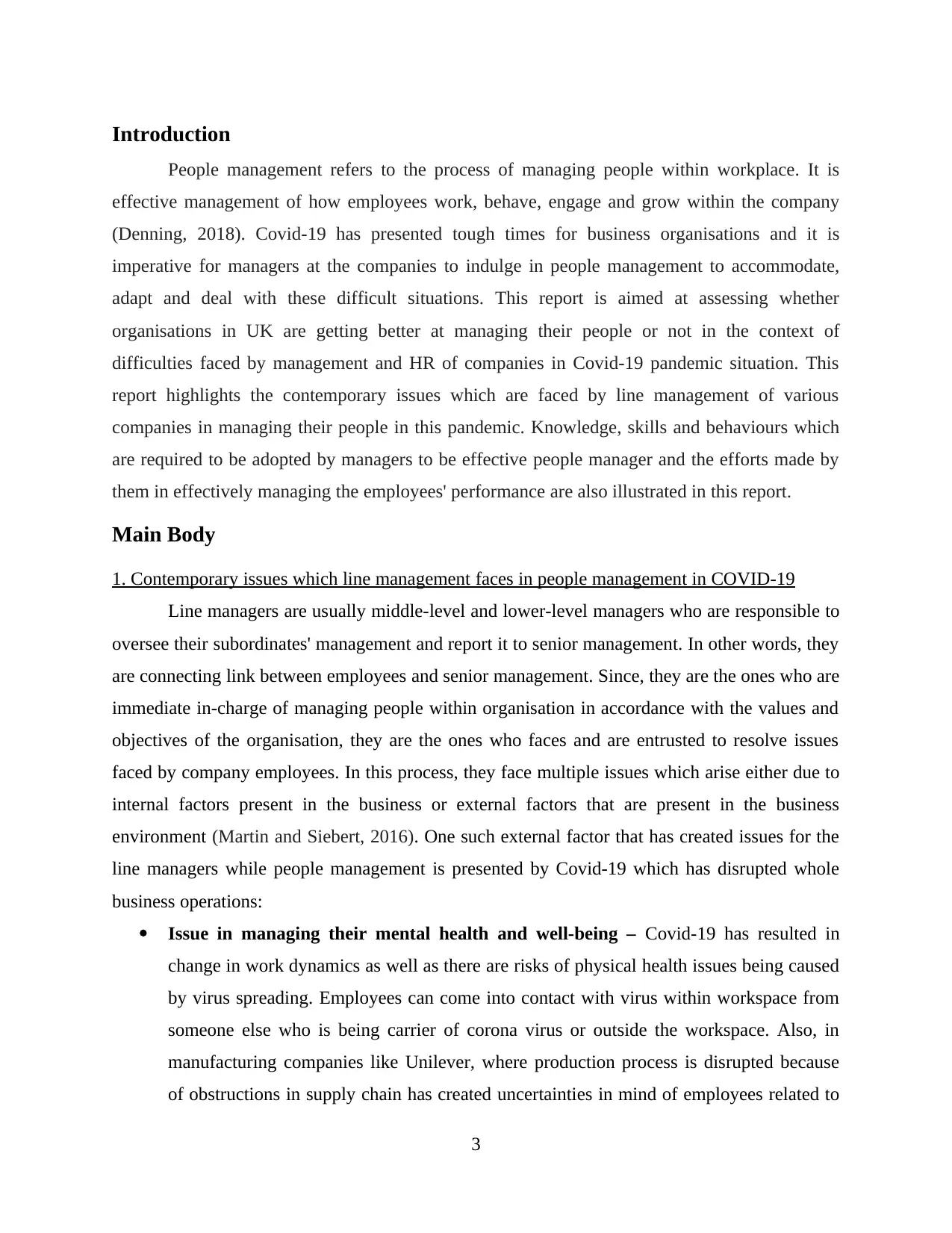
Introduction
People management refers to the process of managing people within workplace. It is
effective management of how employees work, behave, engage and grow within the company
(Denning, 2018). Covid-19 has presented tough times for business organisations and it is
imperative for managers at the companies to indulge in people management to accommodate,
adapt and deal with these difficult situations. This report is aimed at assessing whether
organisations in UK are getting better at managing their people or not in the context of
difficulties faced by management and HR of companies in Covid-19 pandemic situation. This
report highlights the contemporary issues which are faced by line management of various
companies in managing their people in this pandemic. Knowledge, skills and behaviours which
are required to be adopted by managers to be effective people manager and the efforts made by
them in effectively managing the employees' performance are also illustrated in this report.
Main Body
1. Contemporary issues which line management faces in people management in COVID-19
Line managers are usually middle-level and lower-level managers who are responsible to
oversee their subordinates' management and report it to senior management. In other words, they
are connecting link between employees and senior management. Since, they are the ones who are
immediate in-charge of managing people within organisation in accordance with the values and
objectives of the organisation, they are the ones who faces and are entrusted to resolve issues
faced by company employees. In this process, they face multiple issues which arise either due to
internal factors present in the business or external factors that are present in the business
environment (Martin and Siebert, 2016). One such external factor that has created issues for the
line managers while people management is presented by Covid-19 which has disrupted whole
business operations:
Issue in managing their mental health and well-being – Covid-19 has resulted in
change in work dynamics as well as there are risks of physical health issues being caused
by virus spreading. Employees can come into contact with virus within workspace from
someone else who is being carrier of corona virus or outside the workspace. Also, in
manufacturing companies like Unilever, where production process is disrupted because
of obstructions in supply chain has created uncertainties in mind of employees related to
3
People management refers to the process of managing people within workplace. It is
effective management of how employees work, behave, engage and grow within the company
(Denning, 2018). Covid-19 has presented tough times for business organisations and it is
imperative for managers at the companies to indulge in people management to accommodate,
adapt and deal with these difficult situations. This report is aimed at assessing whether
organisations in UK are getting better at managing their people or not in the context of
difficulties faced by management and HR of companies in Covid-19 pandemic situation. This
report highlights the contemporary issues which are faced by line management of various
companies in managing their people in this pandemic. Knowledge, skills and behaviours which
are required to be adopted by managers to be effective people manager and the efforts made by
them in effectively managing the employees' performance are also illustrated in this report.
Main Body
1. Contemporary issues which line management faces in people management in COVID-19
Line managers are usually middle-level and lower-level managers who are responsible to
oversee their subordinates' management and report it to senior management. In other words, they
are connecting link between employees and senior management. Since, they are the ones who are
immediate in-charge of managing people within organisation in accordance with the values and
objectives of the organisation, they are the ones who faces and are entrusted to resolve issues
faced by company employees. In this process, they face multiple issues which arise either due to
internal factors present in the business or external factors that are present in the business
environment (Martin and Siebert, 2016). One such external factor that has created issues for the
line managers while people management is presented by Covid-19 which has disrupted whole
business operations:
Issue in managing their mental health and well-being – Covid-19 has resulted in
change in work dynamics as well as there are risks of physical health issues being caused
by virus spreading. Employees can come into contact with virus within workspace from
someone else who is being carrier of corona virus or outside the workspace. Also, in
manufacturing companies like Unilever, where production process is disrupted because
of obstructions in supply chain has created uncertainties in mind of employees related to
3
⊘ This is a preview!⊘
Do you want full access?
Subscribe today to unlock all pages.

Trusted by 1+ million students worldwide
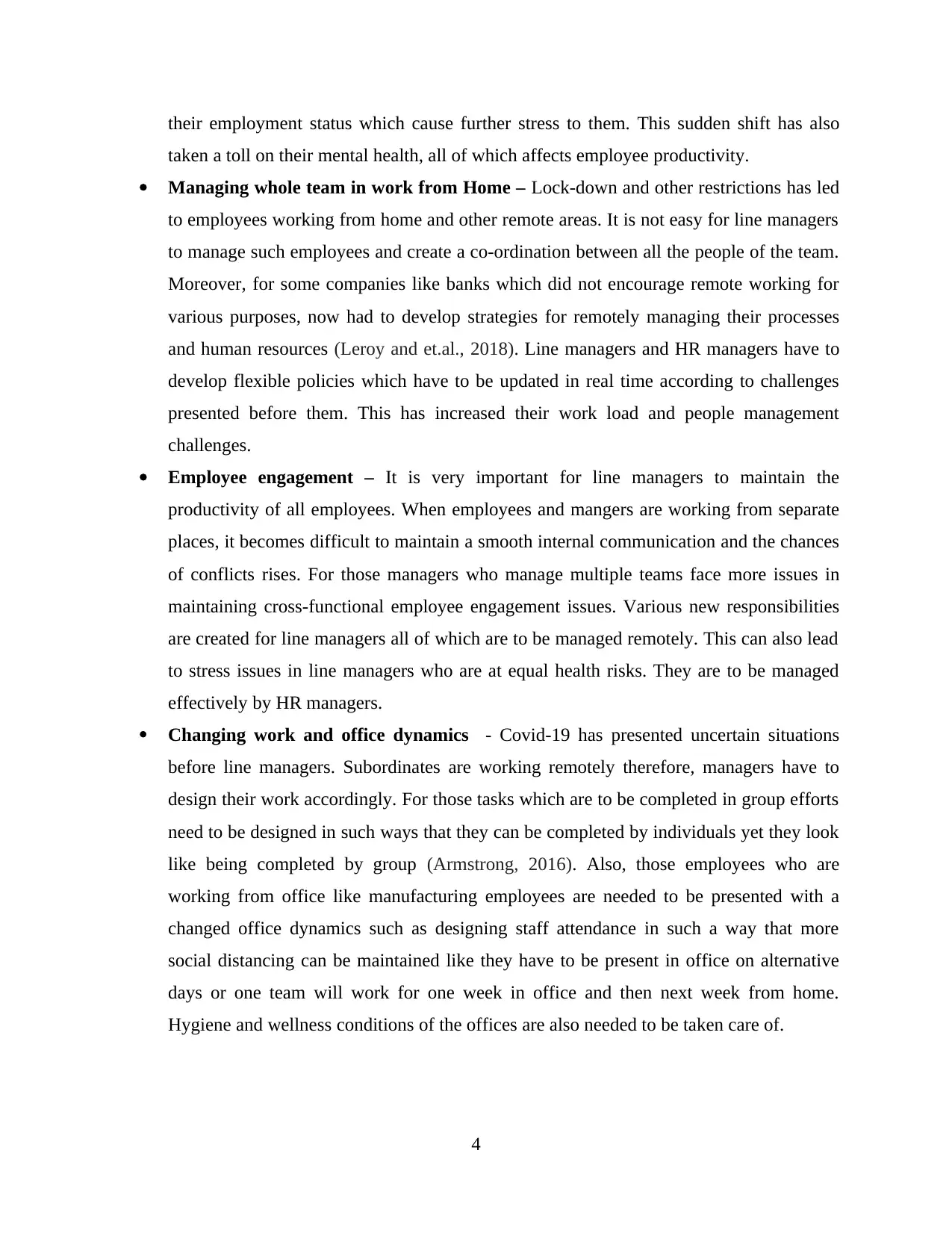
their employment status which cause further stress to them. This sudden shift has also
taken a toll on their mental health, all of which affects employee productivity.
Managing whole team in work from Home – Lock-down and other restrictions has led
to employees working from home and other remote areas. It is not easy for line managers
to manage such employees and create a co-ordination between all the people of the team.
Moreover, for some companies like banks which did not encourage remote working for
various purposes, now had to develop strategies for remotely managing their processes
and human resources (Leroy and et.al., 2018). Line managers and HR managers have to
develop flexible policies which have to be updated in real time according to challenges
presented before them. This has increased their work load and people management
challenges.
Employee engagement – It is very important for line managers to maintain the
productivity of all employees. When employees and mangers are working from separate
places, it becomes difficult to maintain a smooth internal communication and the chances
of conflicts rises. For those managers who manage multiple teams face more issues in
maintaining cross-functional employee engagement issues. Various new responsibilities
are created for line managers all of which are to be managed remotely. This can also lead
to stress issues in line managers who are at equal health risks. They are to be managed
effectively by HR managers.
Changing work and office dynamics - Covid-19 has presented uncertain situations
before line managers. Subordinates are working remotely therefore, managers have to
design their work accordingly. For those tasks which are to be completed in group efforts
need to be designed in such ways that they can be completed by individuals yet they look
like being completed by group (Armstrong, 2016). Also, those employees who are
working from office like manufacturing employees are needed to be presented with a
changed office dynamics such as designing staff attendance in such a way that more
social distancing can be maintained like they have to be present in office on alternative
days or one team will work for one week in office and then next week from home.
Hygiene and wellness conditions of the offices are also needed to be taken care of.
4
taken a toll on their mental health, all of which affects employee productivity.
Managing whole team in work from Home – Lock-down and other restrictions has led
to employees working from home and other remote areas. It is not easy for line managers
to manage such employees and create a co-ordination between all the people of the team.
Moreover, for some companies like banks which did not encourage remote working for
various purposes, now had to develop strategies for remotely managing their processes
and human resources (Leroy and et.al., 2018). Line managers and HR managers have to
develop flexible policies which have to be updated in real time according to challenges
presented before them. This has increased their work load and people management
challenges.
Employee engagement – It is very important for line managers to maintain the
productivity of all employees. When employees and mangers are working from separate
places, it becomes difficult to maintain a smooth internal communication and the chances
of conflicts rises. For those managers who manage multiple teams face more issues in
maintaining cross-functional employee engagement issues. Various new responsibilities
are created for line managers all of which are to be managed remotely. This can also lead
to stress issues in line managers who are at equal health risks. They are to be managed
effectively by HR managers.
Changing work and office dynamics - Covid-19 has presented uncertain situations
before line managers. Subordinates are working remotely therefore, managers have to
design their work accordingly. For those tasks which are to be completed in group efforts
need to be designed in such ways that they can be completed by individuals yet they look
like being completed by group (Armstrong, 2016). Also, those employees who are
working from office like manufacturing employees are needed to be presented with a
changed office dynamics such as designing staff attendance in such a way that more
social distancing can be maintained like they have to be present in office on alternative
days or one team will work for one week in office and then next week from home.
Hygiene and wellness conditions of the offices are also needed to be taken care of.
4
Paraphrase This Document
Need a fresh take? Get an instant paraphrase of this document with our AI Paraphraser
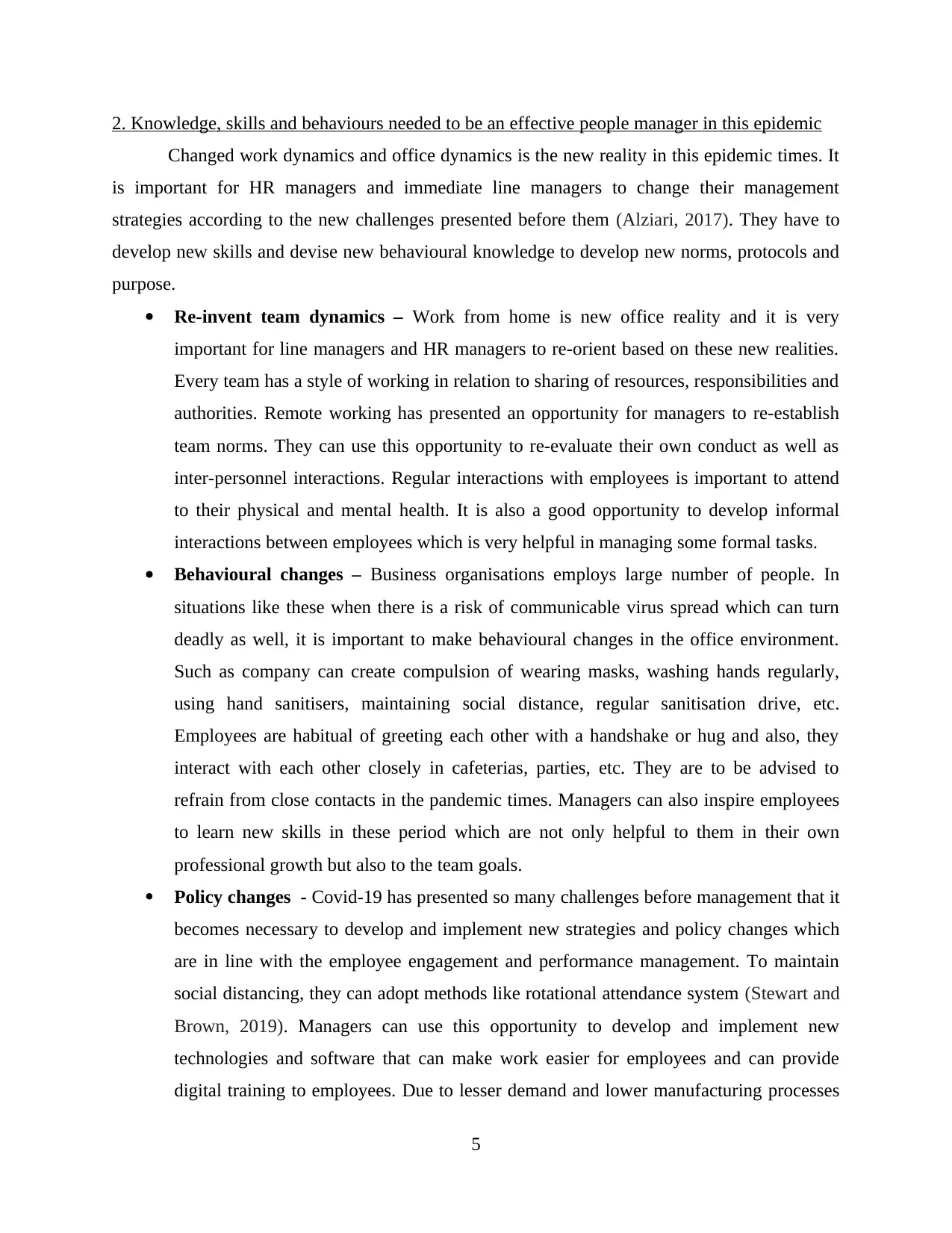
2. Knowledge, skills and behaviours needed to be an effective people manager in this epidemic
Changed work dynamics and office dynamics is the new reality in this epidemic times. It
is important for HR managers and immediate line managers to change their management
strategies according to the new challenges presented before them (Alziari, 2017). They have to
develop new skills and devise new behavioural knowledge to develop new norms, protocols and
purpose.
Re-invent team dynamics – Work from home is new office reality and it is very
important for line managers and HR managers to re-orient based on these new realities.
Every team has a style of working in relation to sharing of resources, responsibilities and
authorities. Remote working has presented an opportunity for managers to re-establish
team norms. They can use this opportunity to re-evaluate their own conduct as well as
inter-personnel interactions. Regular interactions with employees is important to attend
to their physical and mental health. It is also a good opportunity to develop informal
interactions between employees which is very helpful in managing some formal tasks.
Behavioural changes – Business organisations employs large number of people. In
situations like these when there is a risk of communicable virus spread which can turn
deadly as well, it is important to make behavioural changes in the office environment.
Such as company can create compulsion of wearing masks, washing hands regularly,
using hand sanitisers, maintaining social distance, regular sanitisation drive, etc.
Employees are habitual of greeting each other with a handshake or hug and also, they
interact with each other closely in cafeterias, parties, etc. They are to be advised to
refrain from close contacts in the pandemic times. Managers can also inspire employees
to learn new skills in these period which are not only helpful to them in their own
professional growth but also to the team goals.
Policy changes - Covid-19 has presented so many challenges before management that it
becomes necessary to develop and implement new strategies and policy changes which
are in line with the employee engagement and performance management. To maintain
social distancing, they can adopt methods like rotational attendance system (Stewart and
Brown, 2019). Managers can use this opportunity to develop and implement new
technologies and software that can make work easier for employees and can provide
digital training to employees. Due to lesser demand and lower manufacturing processes
5
Changed work dynamics and office dynamics is the new reality in this epidemic times. It
is important for HR managers and immediate line managers to change their management
strategies according to the new challenges presented before them (Alziari, 2017). They have to
develop new skills and devise new behavioural knowledge to develop new norms, protocols and
purpose.
Re-invent team dynamics – Work from home is new office reality and it is very
important for line managers and HR managers to re-orient based on these new realities.
Every team has a style of working in relation to sharing of resources, responsibilities and
authorities. Remote working has presented an opportunity for managers to re-establish
team norms. They can use this opportunity to re-evaluate their own conduct as well as
inter-personnel interactions. Regular interactions with employees is important to attend
to their physical and mental health. It is also a good opportunity to develop informal
interactions between employees which is very helpful in managing some formal tasks.
Behavioural changes – Business organisations employs large number of people. In
situations like these when there is a risk of communicable virus spread which can turn
deadly as well, it is important to make behavioural changes in the office environment.
Such as company can create compulsion of wearing masks, washing hands regularly,
using hand sanitisers, maintaining social distance, regular sanitisation drive, etc.
Employees are habitual of greeting each other with a handshake or hug and also, they
interact with each other closely in cafeterias, parties, etc. They are to be advised to
refrain from close contacts in the pandemic times. Managers can also inspire employees
to learn new skills in these period which are not only helpful to them in their own
professional growth but also to the team goals.
Policy changes - Covid-19 has presented so many challenges before management that it
becomes necessary to develop and implement new strategies and policy changes which
are in line with the employee engagement and performance management. To maintain
social distancing, they can adopt methods like rotational attendance system (Stewart and
Brown, 2019). Managers can use this opportunity to develop and implement new
technologies and software that can make work easier for employees and can provide
digital training to employees. Due to lesser demand and lower manufacturing processes
5
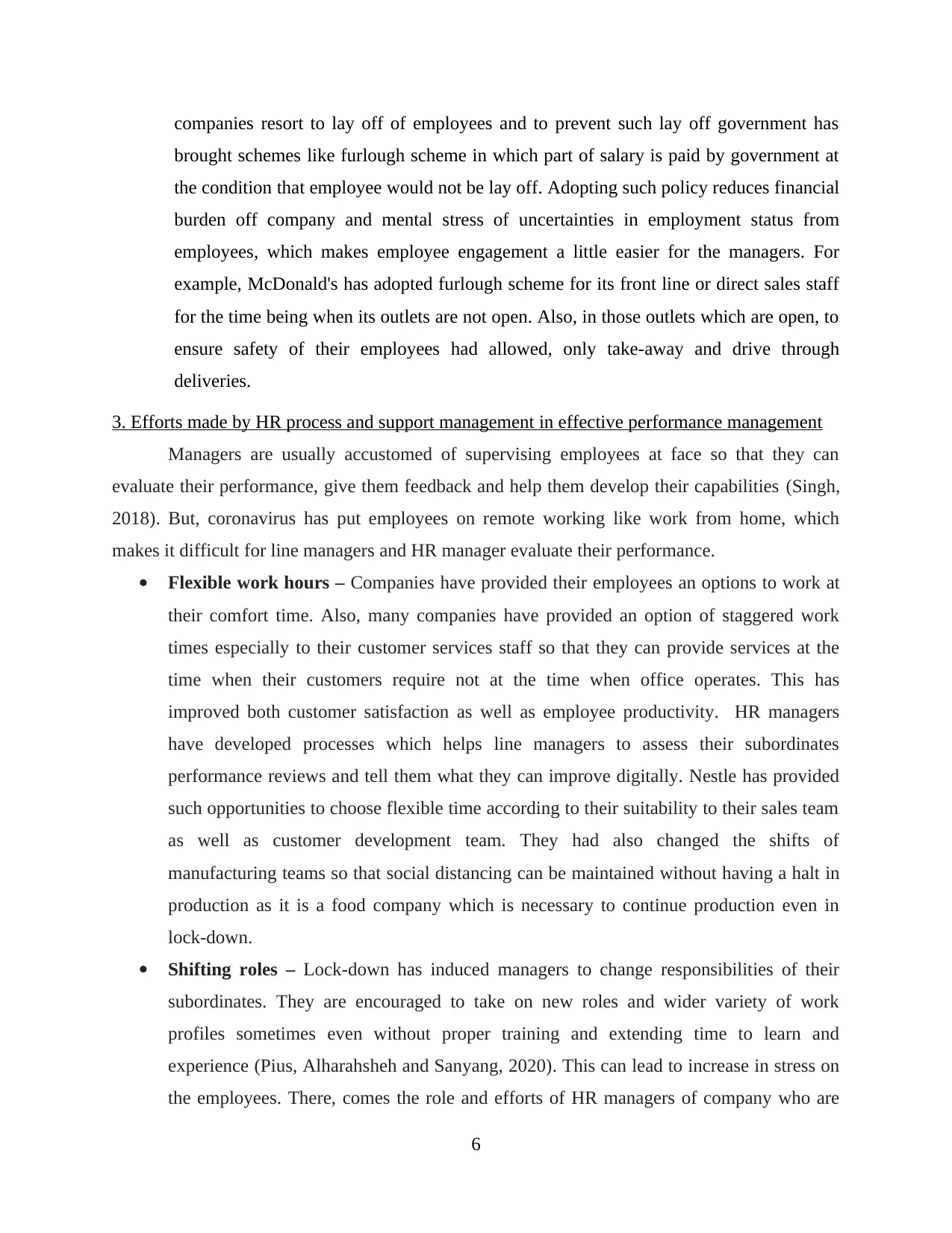
companies resort to lay off of employees and to prevent such lay off government has
brought schemes like furlough scheme in which part of salary is paid by government at
the condition that employee would not be lay off. Adopting such policy reduces financial
burden off company and mental stress of uncertainties in employment status from
employees, which makes employee engagement a little easier for the managers. For
example, McDonald's has adopted furlough scheme for its front line or direct sales staff
for the time being when its outlets are not open. Also, in those outlets which are open, to
ensure safety of their employees had allowed, only take-away and drive through
deliveries.
3. Efforts made by HR process and support management in effective performance management
Managers are usually accustomed of supervising employees at face so that they can
evaluate their performance, give them feedback and help them develop their capabilities (Singh,
2018). But, coronavirus has put employees on remote working like work from home, which
makes it difficult for line managers and HR manager evaluate their performance.
Flexible work hours – Companies have provided their employees an options to work at
their comfort time. Also, many companies have provided an option of staggered work
times especially to their customer services staff so that they can provide services at the
time when their customers require not at the time when office operates. This has
improved both customer satisfaction as well as employee productivity. HR managers
have developed processes which helps line managers to assess their subordinates
performance reviews and tell them what they can improve digitally. Nestle has provided
such opportunities to choose flexible time according to their suitability to their sales team
as well as customer development team. They had also changed the shifts of
manufacturing teams so that social distancing can be maintained without having a halt in
production as it is a food company which is necessary to continue production even in
lock-down.
Shifting roles – Lock-down has induced managers to change responsibilities of their
subordinates. They are encouraged to take on new roles and wider variety of work
profiles sometimes even without proper training and extending time to learn and
experience (Pius, Alharahsheh and Sanyang, 2020). This can lead to increase in stress on
the employees. There, comes the role and efforts of HR managers of company who are
6
brought schemes like furlough scheme in which part of salary is paid by government at
the condition that employee would not be lay off. Adopting such policy reduces financial
burden off company and mental stress of uncertainties in employment status from
employees, which makes employee engagement a little easier for the managers. For
example, McDonald's has adopted furlough scheme for its front line or direct sales staff
for the time being when its outlets are not open. Also, in those outlets which are open, to
ensure safety of their employees had allowed, only take-away and drive through
deliveries.
3. Efforts made by HR process and support management in effective performance management
Managers are usually accustomed of supervising employees at face so that they can
evaluate their performance, give them feedback and help them develop their capabilities (Singh,
2018). But, coronavirus has put employees on remote working like work from home, which
makes it difficult for line managers and HR manager evaluate their performance.
Flexible work hours – Companies have provided their employees an options to work at
their comfort time. Also, many companies have provided an option of staggered work
times especially to their customer services staff so that they can provide services at the
time when their customers require not at the time when office operates. This has
improved both customer satisfaction as well as employee productivity. HR managers
have developed processes which helps line managers to assess their subordinates
performance reviews and tell them what they can improve digitally. Nestle has provided
such opportunities to choose flexible time according to their suitability to their sales team
as well as customer development team. They had also changed the shifts of
manufacturing teams so that social distancing can be maintained without having a halt in
production as it is a food company which is necessary to continue production even in
lock-down.
Shifting roles – Lock-down has induced managers to change responsibilities of their
subordinates. They are encouraged to take on new roles and wider variety of work
profiles sometimes even without proper training and extending time to learn and
experience (Pius, Alharahsheh and Sanyang, 2020). This can lead to increase in stress on
the employees. There, comes the role and efforts of HR managers of company who are
6
⊘ This is a preview!⊘
Do you want full access?
Subscribe today to unlock all pages.

Trusted by 1+ million students worldwide
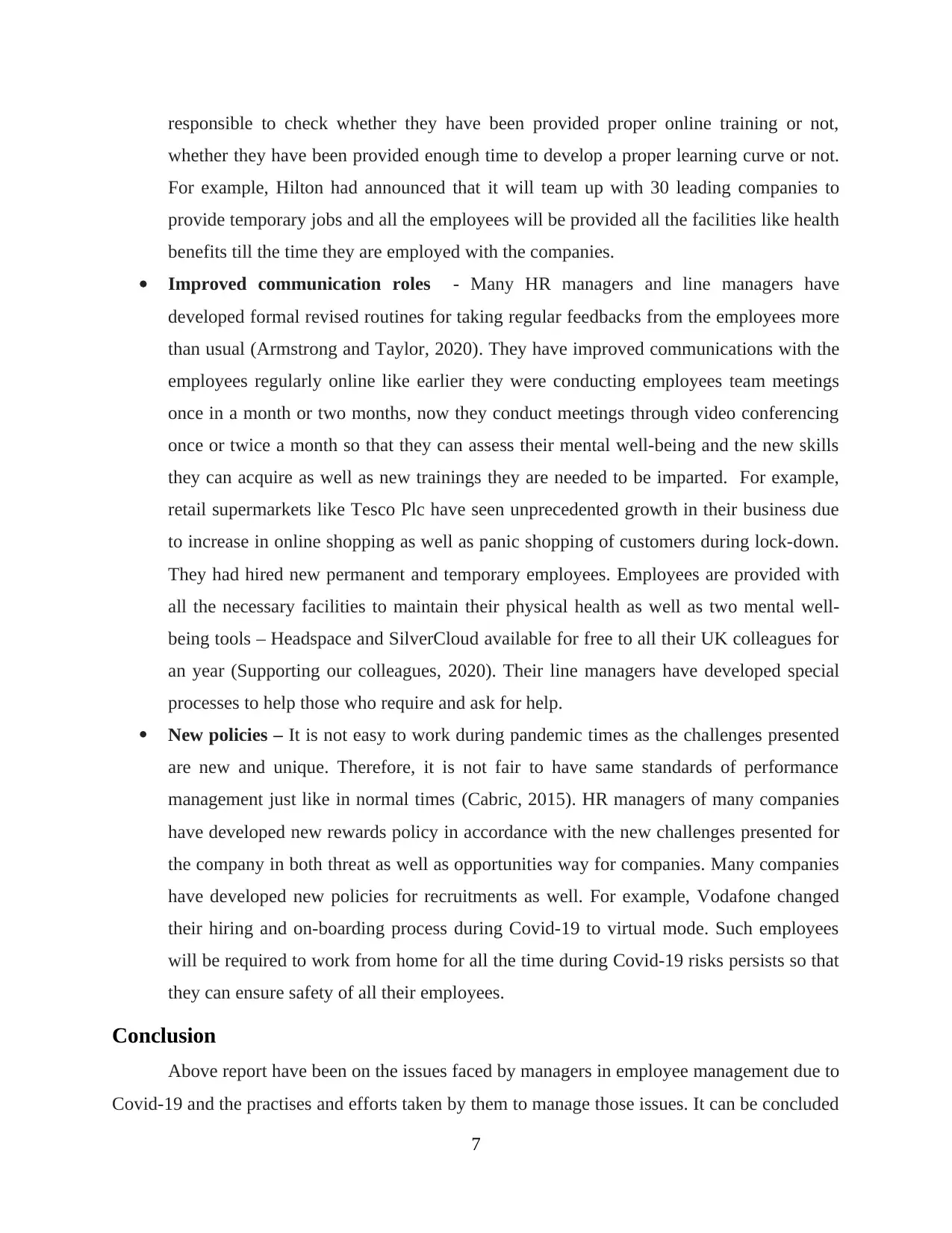
responsible to check whether they have been provided proper online training or not,
whether they have been provided enough time to develop a proper learning curve or not.
For example, Hilton had announced that it will team up with 30 leading companies to
provide temporary jobs and all the employees will be provided all the facilities like health
benefits till the time they are employed with the companies.
Improved communication roles - Many HR managers and line managers have
developed formal revised routines for taking regular feedbacks from the employees more
than usual (Armstrong and Taylor, 2020). They have improved communications with the
employees regularly online like earlier they were conducting employees team meetings
once in a month or two months, now they conduct meetings through video conferencing
once or twice a month so that they can assess their mental well-being and the new skills
they can acquire as well as new trainings they are needed to be imparted. For example,
retail supermarkets like Tesco Plc have seen unprecedented growth in their business due
to increase in online shopping as well as panic shopping of customers during lock-down.
They had hired new permanent and temporary employees. Employees are provided with
all the necessary facilities to maintain their physical health as well as two mental well-
being tools – Headspace and SilverCloud available for free to all their UK colleagues for
an year (Supporting our colleagues, 2020). Their line managers have developed special
processes to help those who require and ask for help.
New policies – It is not easy to work during pandemic times as the challenges presented
are new and unique. Therefore, it is not fair to have same standards of performance
management just like in normal times (Cabric, 2015). HR managers of many companies
have developed new rewards policy in accordance with the new challenges presented for
the company in both threat as well as opportunities way for companies. Many companies
have developed new policies for recruitments as well. For example, Vodafone changed
their hiring and on-boarding process during Covid-19 to virtual mode. Such employees
will be required to work from home for all the time during Covid-19 risks persists so that
they can ensure safety of all their employees.
Conclusion
Above report have been on the issues faced by managers in employee management due to
Covid-19 and the practises and efforts taken by them to manage those issues. It can be concluded
7
whether they have been provided enough time to develop a proper learning curve or not.
For example, Hilton had announced that it will team up with 30 leading companies to
provide temporary jobs and all the employees will be provided all the facilities like health
benefits till the time they are employed with the companies.
Improved communication roles - Many HR managers and line managers have
developed formal revised routines for taking regular feedbacks from the employees more
than usual (Armstrong and Taylor, 2020). They have improved communications with the
employees regularly online like earlier they were conducting employees team meetings
once in a month or two months, now they conduct meetings through video conferencing
once or twice a month so that they can assess their mental well-being and the new skills
they can acquire as well as new trainings they are needed to be imparted. For example,
retail supermarkets like Tesco Plc have seen unprecedented growth in their business due
to increase in online shopping as well as panic shopping of customers during lock-down.
They had hired new permanent and temporary employees. Employees are provided with
all the necessary facilities to maintain their physical health as well as two mental well-
being tools – Headspace and SilverCloud available for free to all their UK colleagues for
an year (Supporting our colleagues, 2020). Their line managers have developed special
processes to help those who require and ask for help.
New policies – It is not easy to work during pandemic times as the challenges presented
are new and unique. Therefore, it is not fair to have same standards of performance
management just like in normal times (Cabric, 2015). HR managers of many companies
have developed new rewards policy in accordance with the new challenges presented for
the company in both threat as well as opportunities way for companies. Many companies
have developed new policies for recruitments as well. For example, Vodafone changed
their hiring and on-boarding process during Covid-19 to virtual mode. Such employees
will be required to work from home for all the time during Covid-19 risks persists so that
they can ensure safety of all their employees.
Conclusion
Above report have been on the issues faced by managers in employee management due to
Covid-19 and the practises and efforts taken by them to manage those issues. It can be concluded
7
Paraphrase This Document
Need a fresh take? Get an instant paraphrase of this document with our AI Paraphraser
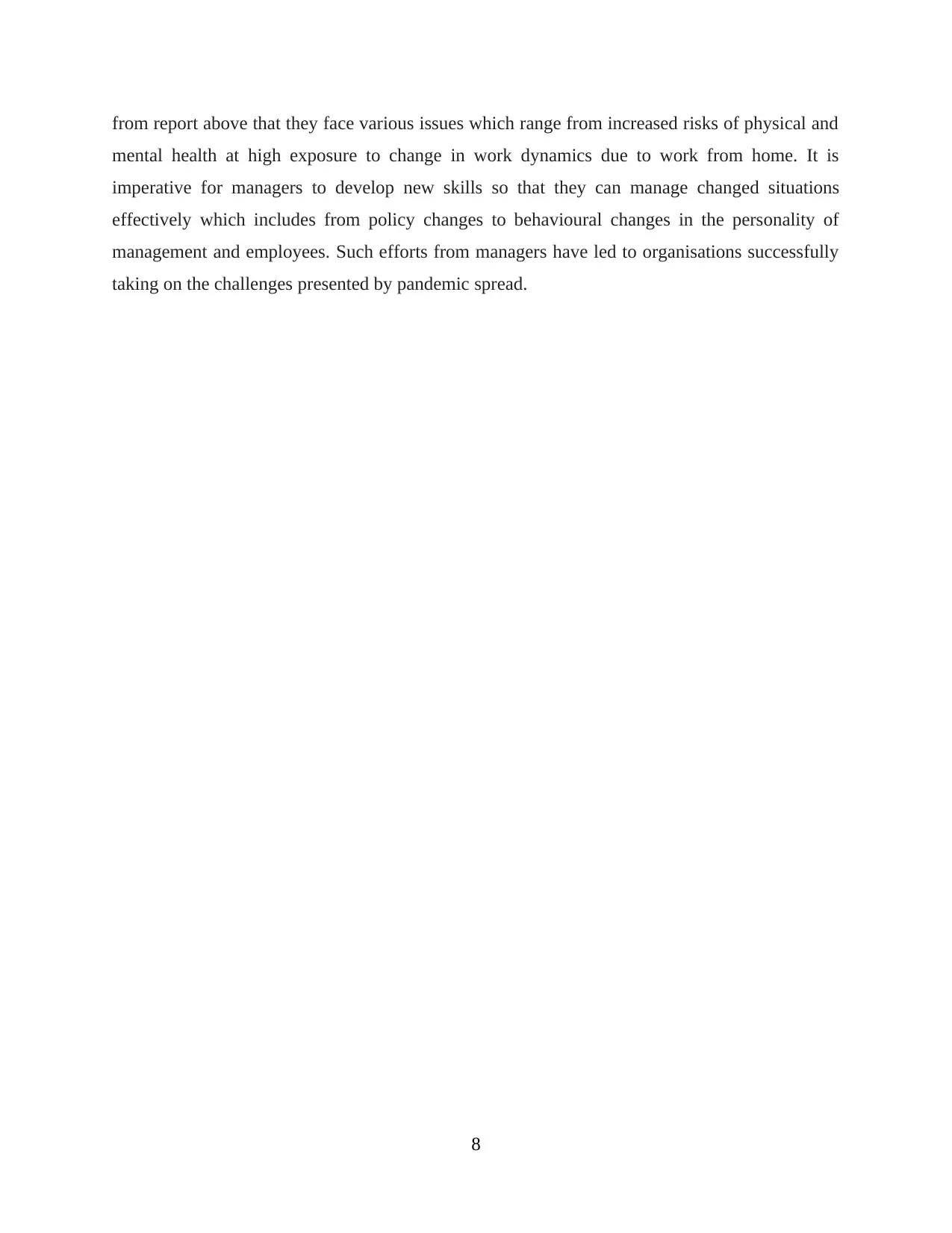
from report above that they face various issues which range from increased risks of physical and
mental health at high exposure to change in work dynamics due to work from home. It is
imperative for managers to develop new skills so that they can manage changed situations
effectively which includes from policy changes to behavioural changes in the personality of
management and employees. Such efforts from managers have led to organisations successfully
taking on the challenges presented by pandemic spread.
8
mental health at high exposure to change in work dynamics due to work from home. It is
imperative for managers to develop new skills so that they can manage changed situations
effectively which includes from policy changes to behavioural changes in the personality of
management and employees. Such efforts from managers have led to organisations successfully
taking on the challenges presented by pandemic spread.
8
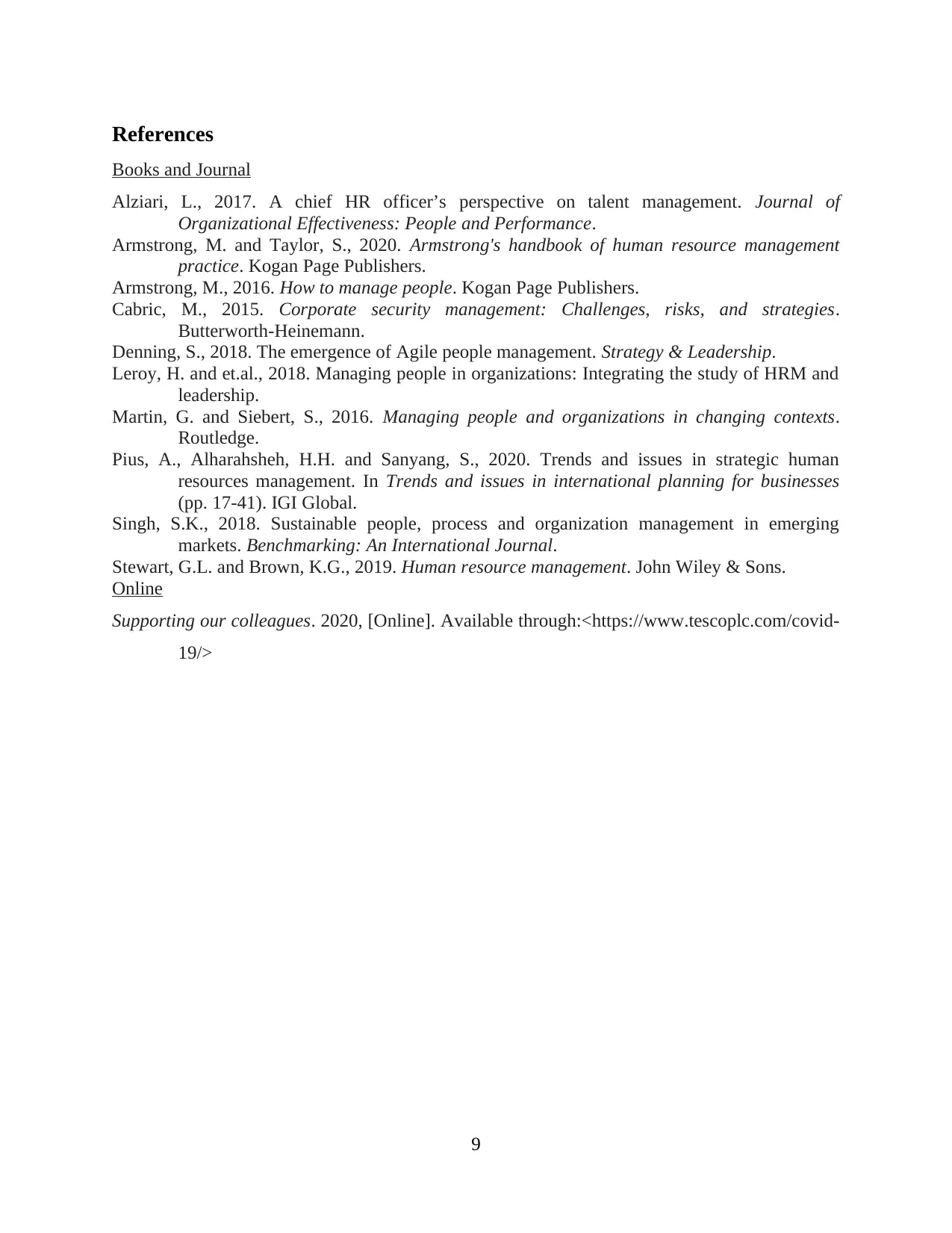
References
Books and Journal
Alziari, L., 2017. A chief HR officer’s perspective on talent management. Journal of
Organizational Effectiveness: People and Performance.
Armstrong, M. and Taylor, S., 2020. Armstrong's handbook of human resource management
practice. Kogan Page Publishers.
Armstrong, M., 2016. How to manage people. Kogan Page Publishers.
Cabric, M., 2015. Corporate security management: Challenges, risks, and strategies.
Butterworth-Heinemann.
Denning, S., 2018. The emergence of Agile people management. Strategy & Leadership.
Leroy, H. and et.al., 2018. Managing people in organizations: Integrating the study of HRM and
leadership.
Martin, G. and Siebert, S., 2016. Managing people and organizations in changing contexts.
Routledge.
Pius, A., Alharahsheh, H.H. and Sanyang, S., 2020. Trends and issues in strategic human
resources management. In Trends and issues in international planning for businesses
(pp. 17-41). IGI Global.
Singh, S.K., 2018. Sustainable people, process and organization management in emerging
markets. Benchmarking: An International Journal.
Stewart, G.L. and Brown, K.G., 2019. Human resource management. John Wiley & Sons.
Online
Supporting our colleagues. 2020, [Online]. Available through:<https://www.tescoplc.com/covid-
19/>
9
Books and Journal
Alziari, L., 2017. A chief HR officer’s perspective on talent management. Journal of
Organizational Effectiveness: People and Performance.
Armstrong, M. and Taylor, S., 2020. Armstrong's handbook of human resource management
practice. Kogan Page Publishers.
Armstrong, M., 2016. How to manage people. Kogan Page Publishers.
Cabric, M., 2015. Corporate security management: Challenges, risks, and strategies.
Butterworth-Heinemann.
Denning, S., 2018. The emergence of Agile people management. Strategy & Leadership.
Leroy, H. and et.al., 2018. Managing people in organizations: Integrating the study of HRM and
leadership.
Martin, G. and Siebert, S., 2016. Managing people and organizations in changing contexts.
Routledge.
Pius, A., Alharahsheh, H.H. and Sanyang, S., 2020. Trends and issues in strategic human
resources management. In Trends and issues in international planning for businesses
(pp. 17-41). IGI Global.
Singh, S.K., 2018. Sustainable people, process and organization management in emerging
markets. Benchmarking: An International Journal.
Stewart, G.L. and Brown, K.G., 2019. Human resource management. John Wiley & Sons.
Online
Supporting our colleagues. 2020, [Online]. Available through:<https://www.tescoplc.com/covid-
19/>
9
⊘ This is a preview!⊘
Do you want full access?
Subscribe today to unlock all pages.

Trusted by 1+ million students worldwide
1 out of 9
Related Documents
Your All-in-One AI-Powered Toolkit for Academic Success.
+13062052269
info@desklib.com
Available 24*7 on WhatsApp / Email
![[object Object]](/_next/static/media/star-bottom.7253800d.svg)
Unlock your academic potential
Copyright © 2020–2026 A2Z Services. All Rights Reserved. Developed and managed by ZUCOL.





